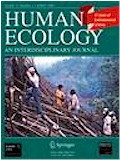| Journal Article |
 |
|
| Article Title | Swidden Transformations and Rural Livelihoods in Southeast Asia | | Author | R.A. Cramb, Carol J. Pierce Colfer, Wolfram Dressler, Pinkaew Laungaramsri, Quang Trang Le, Elok Mulyoutami, Nancy L. Peluso and Reed L. Wadley | | Year | 2009 | | Journal Title | Human Ecology | | Institution | Springer Netherlands | | Volume | 37 | | Issue | 3 | | Pages | 259-392 | | Call Number | JA0364-10 | | Keywords | Agrarian change . Uplands . Livelihood strategies . Resource tenure . Food security . Agency |
|
| Abstract: |
| This paper explores the major interactions between the transformation of swidden farming and the pursuit of rural livelihoods in the uplands of Southeast Asia. The
paper draws on selected literature, workshop reflections, and six case studies to describe the causal processes and livelihood consequences of swidden change. Householdlevel livelihood responses have included both the intensification and ‘dis-intensification’ of swidden land-use, the insertion of cash crops, the redeployment of household labour, and the taking on of broader (often non-rural) livelihood aspirations and strategies. At the community level there have been emerging institutional arrangements for management of land and forests, and varying degrees of participation in or resistance to government schemes and programs. Swidden change has led to the loss and also the reassertion, realignment, and redefinition of cultures and
identities, with important implications for access to resources. The impacts of these changes have been varied. Cash crops have often improved livelihoods but complete specialisation for the market increases vulnerability. Thus swidden can still provide an important safety net in the face of market fluctuations. Improved access to markets and social provision of education and health care have mostly improved the welfare of previously isolated groups. However, growing differences within and between communities in the course of swidden transformations can leave some groups marginalized and worse off. These processes of differentiation can be accentuated by heavy-handed state interventions based on swidden stereotypes. Nevertheless, communities have not passively accepted these pressures and have mobilized to
protect their livelihood assets and strategies. Thus swidden farmers are not resisting appropriate and supportive forms of development. They are adopting new practices and engaging with markets, but in many situations swidden is still important to their livelihood strategies, providing resilience in the face of turbulent change. Active involvement of local people is essential in planning, implementing, monitoring
and evaluating development and conservation programs in swidden lands. Positive market incentives and supportive government policies are better than standardised, top-down directives. |
|
|
Download file(s): Click icon to download/open file.
|
| |
File Size |
Description |

|
668 KB |
Softcopy |

|
- |
URL |
|
|
GRP 2: Maximizing on-farm productivity of trees and agroforestry systems
GRP 5: Improving the ability of farmers, ecosystems & governments to cope with climate change
|
| Viewed in 2383 times. Downloaded in 1409 times. |